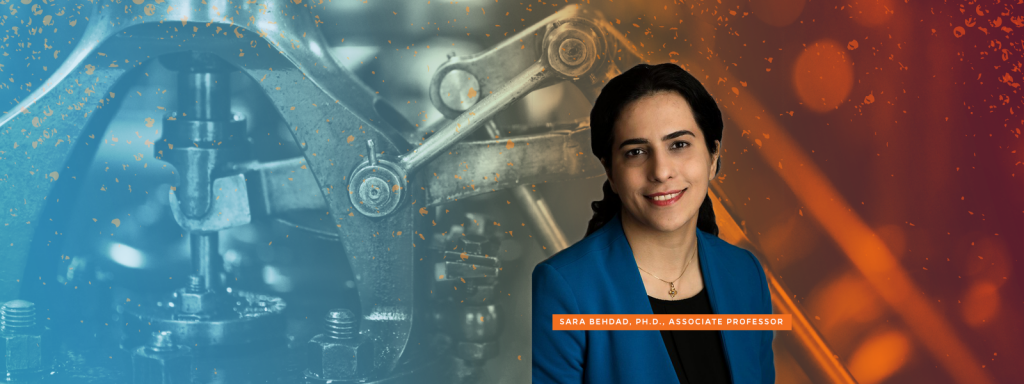
Sara Behdad, Ph.D., an associate professor of environmental engineering sciences within the Engineering School of Sustainable Infrastructure & Environment (ESSIE), received a $1.5 million grant from the National Science Foundation to create human-robot collaboration (HRC) and improve the disassembly of end-of-use products.
Remanufacturing is an industrial process that takes an old or used product and returns it to a “like-new” performance level and quality. In the remanufacturing industry, discarding electronic materials can be a labor-intensive process. It requires direct contact with elements that can be potentially harmful to workers.
As principal investigator, Dr. Behdad plans to provide recommendations to improve the current disassembly sequence guidelines, which will positively enhance the quality of life for workers. Dr. Behdad’s robust background in sustainable design, disassembly planning, and remanufacturing analysis gives her insights to challenge the knowledge gaps in disassembly guidelines with the addition of collaborative robots (cobots).
“The existing literature assumes that disassembly is manually done and does not consider enhancements necessary for robots such as safety constraints, the order of operations, quality, and quantity of parts. We aim to overcome this challenge by incorporating the feasibility of conducting disassembly operations with people and robots,” Dr. Behdad said. “Second, our research will model the uncertain nature of current disassembly operations and identify the optimal disassembly sequence, along with the allocation of tasks among human and robot, and design guidelines.”
This project is part of a $3 million collaborative effort between the University at Buffalo (UB) and the University of Florida (UF). Research spans across several disciplines due to complementary expertise in robotics, remanufacturing, data analytics, human systems and safety, and economics. This transdisciplinary collaboration involves the effort of multiple researchers, including Boyi Hu, Ph.D., in the UF Department of Industrial & Systems Engineering and Gülcan Önel, Ph.D., from the UF Institute of Food and Agricultural Sciences.
Dr. Behdad explains that her research is a portion of the research from UB and UF. Like an assembly line, there are many moving parts.
“To conduct the research, we plan to tackle five main interdependent research tasks. First, work environment monitoring with human motion prediction lead by Dr. Xiao Liang at UB. Then, Dr. Minghui Zheng at UB will lead planning, learning, and control for collaborative robots. Then, I will lead disassembly sequence planning and exploring HRC-inspired design guidelines part. Dr. Hu will lead the human-robotics system integration. And finally, the modeling and prediction of economic impacts of HRC in remanufacturing environments will be led by Dr. Önel,” Dr. Behdad said.
The manual, labor-intensive nature of remanufacturing and potential health issues from the informal recycling of toxic materials are taken into consideration. The team hopes to develop robot-assisted disassembly to enhance the quality of life for workers.
The team’s goal is to advance the future of the remanufacturing industry through human and robot integrations.
“The research team will develop models to enhance the fundamental understanding of the way humans and robots distribute tasks, cooperate, and interact in a safe and complementary manner,” Dr. Behdad added.
—
Dr. Behdad recently joined the Department of Environmental Engineering Sciences in spring. She received her bachelor’s and master’s degrees in industrial engineering from Tehran Polytechnic University and her doctorate in Industrial and Systems Engineering from the University of Illinois at Urbana-Champaign. For more information on her research, visit https://www.nsf.gov/awardsearch/showAward?AWD_ID=2026276.